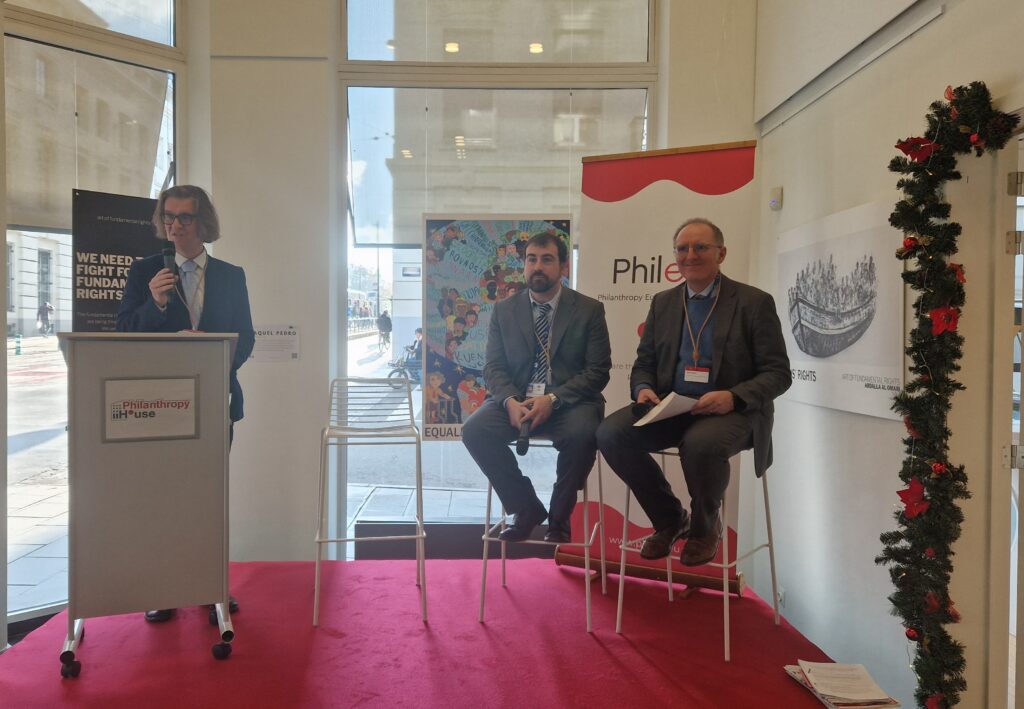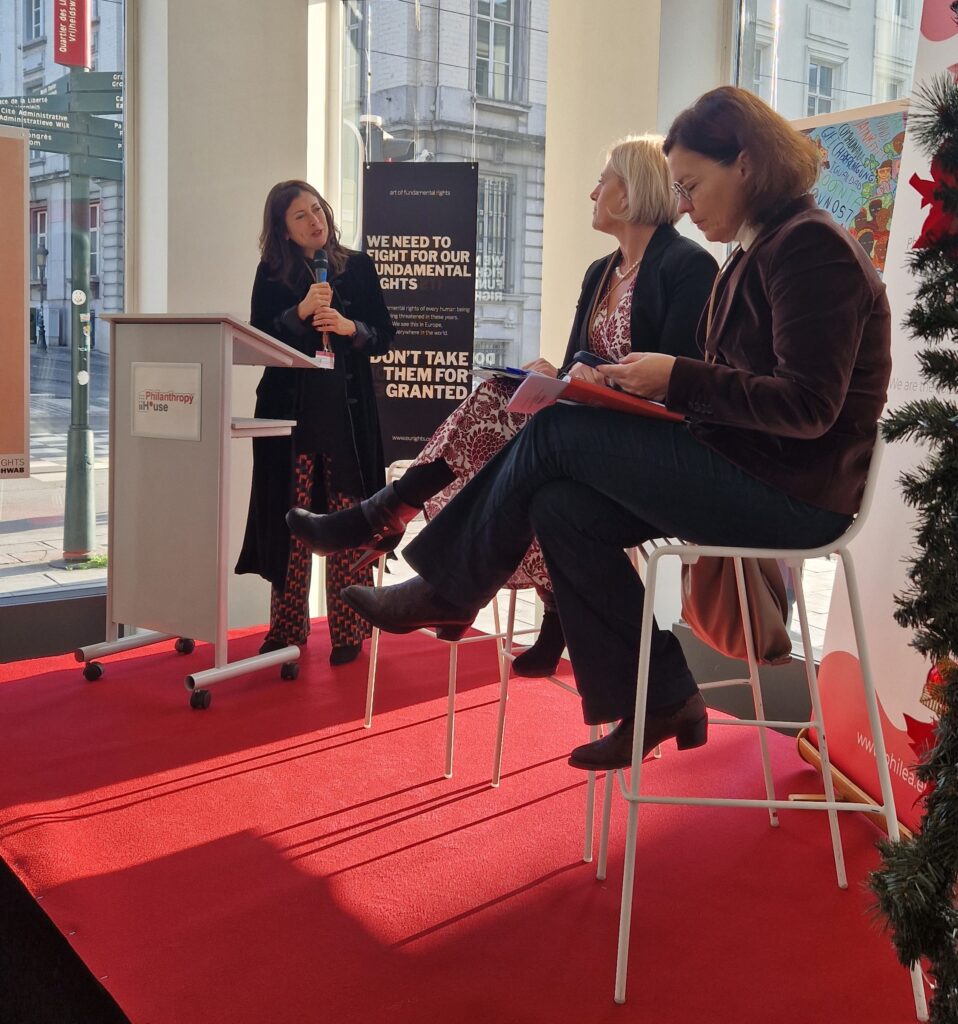Co-creating the Future of Europe in Difficult Times – EuroPhilantopics 2022
On 6 December, we opened the doors of Philanthropy House for EuroPhilantopics 2022, our flagship policy event. With the intent to strengthen the relationship between our sector and EU policymakers, we hosted conversations on how to defend the core European values based on the rule of law, fundamental rights, and democratic institutions that work for people and the planet, leaving no one behind.
In light of the intersecting crises we are facing, there has never been a greater need to discuss solutions to societal issues, co-create agendas, and work in partnership. How can philanthropy engage with policymakers when addressing climate change, increasing inequality, the decline of democracy, and a war in Europe? How can we ensure that, one year after the introduction of the Social Economy Action Plan, the obstacles for philanthropy to operate cross-border are removed and the sector is better recognised and supported?
These are some of the questions that were addressed by more than 80 representatives from philanthropic organisations and EU institutions during EuroPhilantopics 2022.
Opening panel: A conversation with the European Commission
Before diving into specific issue-based conversations, the event kicked off with an opening panel with representatives from the European Commission, where the implementation of new legislative tools to enable philanthropy to fulfil its potential were discussed.
Delphine Moralis, Philea CEO, stressed the relevance of EuroPhilantopics in strengthening collaboration between EU institutions and our sector, mentioning the Social Economy Action Plan, the Philanthropic Capital Study and Expert Report on Innovative Funding as good examples of joint efforts.
Angel Font, Philea President, officially presented a new publication on the philanthropy environment in Europe, which merges key findings from the 2022 Lilly School Global Philanthropy Environment Index and Philea’s 2022 Comparative Highlights of Foundation Laws.
The panel then welcomed Santina Bertulessi, Deputy Head of Cabinet of DG EMPL, and Valentina Superti, Director of DG GROW. When asked by Carola Carazzone, Philea Vice-President, what the EU can do to better recognise and enable philanthropy, Santina Bertulessi highlighted the ongoing initiatives launched within the SEAP. She referred, for instance, to the Council Recommendations and the European Commission’s work on the guidance to Member States on how to better implement the non-discrimination principle for cross-border philanthropy.
When asked to shed some light on the intention behind the SEAP, Valentina Superti referred to the Social Economy and Proximity Industrial Ecosystem as a concrete example of its application. She also mentioned the work done by the European Commission with the response to the report put forward by the MEP Sergey Lagodinsky on a European Statute for Associations and NPOs.
During the second part of the panel, Ludwig Forrest, King Baudouin Foundation Head of Philanthropy and Philea Legal Affairs Committee co-chair, invited Filippo Munisteri, Deputy Head of Unit DG ECFIN and Albert Raedler, Policy Officer DG TAXUD, to share their views on the implementation of the Social Economy Action Plan.
Filippo Munisteri highlighted the Philanthropic Capital Study as a starting point for the evaluation on the feasibility of establishing co-investment facilities between the philanthropy sector and the EU as announced in the SEAP.
Albert Raedler then gave an update on the developments of the staff working document on tax questions of cross-border philanthropy and the collection of infringement procedures.
The tone was set: The moment is now to unleash the full potential of philanthropy.

Breakout sessions
The opening panel introduced the participants to the conversations held in the following breakout sessions:
- “Democracy, rule of law, fundamental rights and media freedom in a new light”, facilitated by Martijn Roos, Adessium Foundation
- “Philanthropy and EU Missions in Horizon Europe”, facilitated by João de Almeida Pedro, Gulbenkian Foundation
- “New European Bauhaus ‒ Bridging climate and culture: What’s in it for philanthropy?”, facilitated by Dea Vidovic, Kultura Nova Foundation
- “If not now, when? Philanthropy catalysing joint action on climate”, facilitated by Francesca Mereta, Assifero
- “Driving social inclusion and equality”, facilitated by Lourdes Marquez de la Calleja, ONCE Foundation
- “European Social Innovation Catalyst Fund Next Generation”, facilitated by Madeleine Clark, Genio Trust
After two rounds of conversations, participants were invited by Hanna Surmatz and Hanna Hanses from Philea to share some key takeaways:
Democracy, rule of law, fundamental rights and media freedom in a new light
The reports from the breakout session on Democracy highlighted how foundations are supporting grantees of the EU CERV programme with match funding; how they contribute to the promotion of rule of law and democracy and fundamental rights in many different ways; but also that some of the EU financial rules seem to be too administrative and hindering efforts for co-investment/co-granting ideas. A call was made to now use the momentum for the European Commission, European Investment Fund, European Investment Bank and the philanthropy sector to work on a dedicated co-investment facility for philanthropy under the Invest EU programme.
Philanthropy and EU Missions in Horizon Europe
The session on missions revealed that the role of foundations in the 5 EU missions under Horizon Europe could be further explored. Foundations can provide knowledge, scaling up, networks and connections to local actors as well as co-investment and co-funding. While collaboration with foundations in the smart cities mission is already happening to some extent, more engagement could be developed also around the other 4 Horizon missions.
New European Bauhaus ‒ Bridging climate and culture: What’s in it for philanthropy?
The New European Bauhaus conversations also referred to EU financial regulations as a barrier to developing innovative co-funding/co-creation ideas. However, a new study makes the case for a collaborative NEB HUB, and Philea and the European Cultural Foundation are part of an NEB Task Force to explore next steps around moving collaborations forward.
If not now, when? Philanthropy catalysing joint action on climate
The session on climate discussed how more and more foundations are considering climate as a cross-cutting theme. The sector is engaging around the EU Climate pact and more collaboration opportunities should be explored around EU financial instruments.
Driving social inclusion and equality
The Social Economy Action Plan officially recognised the important and innovative role that philanthropy plays in driving social inclusion and equality. The session looked at new ways to ease collaboration for example via the EU Social Economy gateway, the already existing Social Economy Helpdesk and a potential co-investment facility under Invest EU. Foundations have a lot to offer also on the innovation side when moving the digital, green and social transformations.
European Social Innovation Catalyst Fund Next Generation
The European Social Innovation Catalyst Fund approach could serve as a model of how public and private resources from philanthropy could be brought together. Exploring new governance models, where expertise and knowledge from the foundation sector and the EU are combined, could trigger innovation and open the door for sustainable solutions.

Carola Carazzone and Delphine Moralis closed the event with a final remark on the importance of these conversations between EU policymakers and our sector. EuroPhilantopics 2022 was an excellent moment to share views, and the call is now on us to leverage the momentum around these new ideas.
During the reception, the director of the Danish NGO NYT Europa introduced their exhibition “The Arts of Fundamental Rights”, which will be hosted by Philanthropy House during the next months.
Contacts


